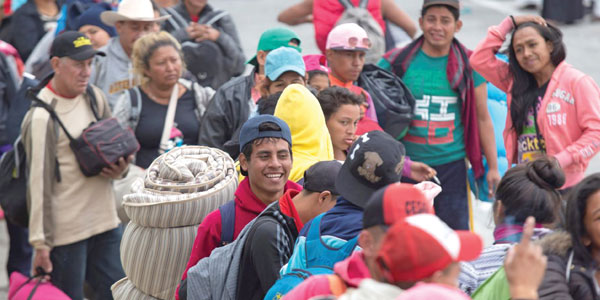
By Jorge Ramos
MIAMI — Central Americans will continue to flee their homes and head north no matter what sort of agreements the presidents of Mexico and the United States come to. Powerful forces — brutal violence, extreme poverty, the effects of climate change — are driving these men, women and children to leave. They are also being motivated to go north by the hope that they might live in the world’s wealthiest country. Simply put, the new wall that President Trump and Mexican President Andrés Manuel López Obrador are putting up in the form of an immigration agreement isn’t going to stop them.
Last October when I was in the southern Mexican state of Chiapas, I met a man in the city of Tapachula. “I was going to die in Honduras anyway,” he told me. “I’d rather take my chances and die in another country.” He was pushing a trolley that held his 1-year-old daughter. They were traveling with a caravan of roughly 7,000 Central Americans heading north through Mexico. I also met an 11-year-old girl from Honduras. She remained silent when I asked her about the gangs back home. (You can watch video of my conversations with these immigrants here.)
It’s not hard to understand why they want to leave their homes. “Violent crime is rampant in Honduras,” says Human Rights Watch’s World Report 2019. “Despite a downward trend in recent years, the murder rate remains among the highest in the world.” If your teenage son was being pressured to join a gang, or if your daughter faced threats of rape, what would you do?
El Salvador also has one of the world’s highest homicide rates, which is creating a drag on the economy. According to the World Bank, “crime and violence [in El Salvador] make doing business more expensive, negatively affect investment decisions and hinder job creation.”
As for Guatemala, in addition to the economic damage caused by the drop in international coffee prices, the nation is also struggling with the effects of climate change, including severe droughts. The headline of a recent New York Times column by Nicholas Kristof, written from Guatemala, says it all: “Food Doesn’t Grow Here Anymore. That’s Why I Would Send My Son North.” Facing dying crops, tens of thousands of Guatemalans have left their homes to make the journey to the United States. Many more will follow.
The Mexico-Guatemala border has always been open to travelers. Last year I crossed the Suchiate River, which forms a natural border between the two countries, without anyone asking for my passport. But all that may be about to change.
The recently formed Mexican National Guard is still just an experiment and has yet to prove its effectiveness. And yet, as directed by Mr. Trump and Mr. López Obrador’s immigration deal, 6,000 of its agents will soon be deployed to the country’s southern border to make it harder for Central Americans to cross into Mexican territory.
In addition, Mexico has publicly agreed to serve as a “waiting room” for the United States. That means that thousands of Central American asylum seekers have to wait in Mexican cities, possibly for months or even years, while their claims are being processed. Mexico is doing what President Trump wants: serving as his immigration police force.
But the Mexican National Guard should be focusing on fighting crime at home, not on stopping harmless Central Americans from reaching the United States — particularly when 14,000 Mexicans have been murdered since AMLO (as President López Obrador is known) took office. Among those killed was the journalist Norma Sarabia. She was gunned down this past week outside her home in the state of Tabasco, the sixth reporter murdered in Mexico this year.
Stopping this violence should be AMLO’s No. 1 priority. Instead, Mexico is diverting huge sums of money to do President Trump’s dirty work.
I am happy, as all Mexicans are, that the United States has decided not to impose tariffs on Mexican products, which could have derailed the new United States-Mexico-Canada trade agreement. On the other hand, I am heartbroken that Mexico has given in to Mr. Trump’s demands. I’m sure that more demands will follow.
Mr. López Obrador recently said that Mexico “will stick to a no-confrontation policy” with Mr. Trump. Unfortunately, Mr. Trump isn’t abiding by the same policy. The American president is a bully, and now he knows that Mexico will do what he wants if he applies a little pressure. Mexico, after all, is Mr. Trump’s enemy of choice, and he will stick to the same strategy of attacking the country during his 2020 re-election campaign. And now he knows how to crush us.
Yet it is the Central American immigrants who are the real losers in this crisis. They have every right to feel betrayed. During the early days of the López Obrador administration, Mexico welcomed them, promising them visas and jobs. Then, without notice, the government started deporting them by the tens of thousands. Now, with this new immigration deal in place, Central Americans will have no safe passage at all.
Nothing can stop a mother and a father when their children’s lives are in danger. The AMLO-Trump deal may slow down the Central American immigration wave, but it won’t stop it. It’s simply too powerful.
I remember the day I met Oscar, a 10-year-old boy from Honduras, in the smothering heat of Tapachula. Although he was exhausted, he wouldn’t stop walking. “What do you think about the United States?” I asked. “That it is pretty,” he answered.
Mr. Trump and Mr. López Obrador will never be able to kill that sort of hope.
___________________________________________________________________________
Trump y AMLO no los detendrán
MIAMI — No importa lo que hagan los Presidentes de México y Estados Unidos, los inmigrantes centroamericanos seguirán huyendo de sus países hacia el norte. Es muy poderoso lo que los empuja a emigrar de Honduras, El Salvador y Guatemala: violencia brutal, pobreza extrema y cambio climático. Y es muy atractivo lo que buscan: la posibilidad de vivir en el país más rico del mundo. El nuevo muro Donald Trump-Andrés Manuel López Obrador no los podrá detener.
“De morir en Honduras, mejor morir en otro país”, me dijo en Tapachula, México, un padre que empujaba en una carriola a una niña de 1 año. Él era parte de esa primera gran caravana de unos 7.000 centroamericanos que cruzó México en octubre del año pasado. En ese mismo grupo había una niña hondureña de 11 años que se quedó en silencio cuando le pregunté sobre las Maras en su país. Ella, desde pequeña, aprendió a oler el peligro.
“Los delitos violentos son un problema generalizado en Honduras. El país sigue presentando una de las tasas de homicidios más altas del mundo”, dice el Informe Mundial de Human Rights Watch 2019. No es difícil entender por qué emigran los hondureños. Si tú tuvieras un hijo adolescente que está siendo obligado a formar parte de una pandilla o a una hija que está amenazada de violación, ¿qué harías?
El Salvador sufre un problema parecido, pese a los recientes avances económicos y de contar con un nuevo presidente, Nayib Bukele. “El Salvador todavía tiene uno de los niveles de criminalidad más altos a nivel mundial […]. El crimen y la violencia aumentan el costo de crear negocios y afectan negativamente las inversiones y la creación de empleos”, advierte un informe del Banco Mundial.
Y Guatemala, además de sufrir la caída en los precios internacionales del café, tiene un particular problema de cambio climático: sequías graves. “Aquí ya no crece la comida; por eso mandaría a mi hijo al norte”, le dijo una guatemalteca a Nicholas Kristof en una de sus columnas más recientes de The New York Times. El subtítulo del artículo resume la historia: “Una alternativa difícil para los guatemaltecos: ver desaparecer sus cosechas y quizás morir con ellas o emigrar”. Miles de guatemaltecos ya han respondido con sus pies, dejando su casa y caminando al norte. Y muchos más seguirán el mismo camino.
La frontera entre México y Guatemala siempre ha estado abierta. El año pasado crucé en una balsa el Suchiate —el río que divide a ambos países— y nadie, en ninguna de las dos orillas, me pidió pasaporte. Pero eso podría empezar a cambiar.
La Guardia Nacional de México es todavía un experimento. Acaba de ser creada y no ha probado su efectividad. Sin embargo, 6.000 de sus miembros sí les complicarán el paso a los centroamericanos por el sur de México, como acordaron recientemente en Washington los representantes de AMLO y Trump.
México aceptó públicamente convertirse en la sala de espera de Estados Unidos. A pesar de que, como informó recientemente The New York Times, esto ha sucedido durante un tiempo. Miles de inmigrantes centroamericanos tendrán que esperar meses o años en ciudades fronterizas del lado mexicano para solicitar asilo político en Estados Unidos. Aún no hay un acuerdo en cómo llamarán a esta nueva política, pero México va a hacer lo que el presidente de Estados Unidos quería: convertirse en la policía migratoria de Trump.
Tratará de lograr lo que la Patrulla Fronteriza de Estados Unidos no pudo hacer. La Guardia Nacional debería dedicarse, principalmente, a reducir la criminalidad en México en lugar de detener a inmigrantes centroamericanos inocentes que quieren llegar a Estados Unidos. Más de 14.000 mexicanos han sido asesinados desde que AMLO tomó posesión, entre ellos el estudiante Norberto Ronquillo —quien fue secuestrado al salir de su universidad en Ciudad de México— y la comunicadora Norma Sarabia —asesinada en la puerta de su casa en el estado de Tabasco, la sexta periodista en morir este año. Esta debería ser la prioridad de AMLO. Pero México está desviando recursos enormes para hacerle el trabajo sucio a Trump.
Celebro, con todos los mexicanos, que Estados Unidos no impuso aranceles a los productos de México y que no se haya descarrilado la aprobación del nuevo tratado de libre comercio, el T-MEC. Pero me duele enormemente que México haya cedido a los chantajes de Trump. Y vienen más.
El presidente López Obrador, en una de sus conferencias mañaneras, dijo que “vamos a continuar la política de no confrontación” con Trump. El problema es que Trump no sigue esa misma política. El Presidente de Estados Unidos es un “bully,” un abusivo, y ya se dio cuenta de que México cedió rapidito ante sus presiones y va a seguir usando la misma estrategia para buscar su reelección hasta noviembre de 2020. México es el enemigo favorito de Trump. Y ahora ya sabe cómo ganar.
Los grandes perdedores de esta crisis son los centroamericanos, quienes tienen motivos legítimos para abandonar sus países. Y, además, hondureños, salvadoreños y guatemaltecos tienen toda la razón en sentirse engañados. Los primeros días de AMLO en el poder fueron recibidos en México con los brazos abiertos y con promesas de visas y trabajo. Luego, sin avisar, México empezó a deportar a miles de personas a sus países de origen. Y ahora, tras el acuerdo con Trump, la nueva orden es: no hay paso.
A pesar de las nuevas restricciones, nada puede detener a un padre o a una madre que quiere salvar a sus hijos. El acuerdo entre Trump y AMLO no podrá terminar totalmente con esta ola centroamericana. Sí, la pueden desacelerar. Pero no acabar con ella. Es demasiado poderosa.
En medio de un calor sofocante y un sol castigador, recuerdo el encuentro en Tapachula, Chiapas, con Óscar, un niño hondureño de 10 años. A pesar del cansancio, seguía caminando. “¿Qué piensas de Estados Unidos?”, le pregunté. “Que es bonito”, me contestó. Trump y AMLO tampoco podrán matar esa esperanza nunca.









